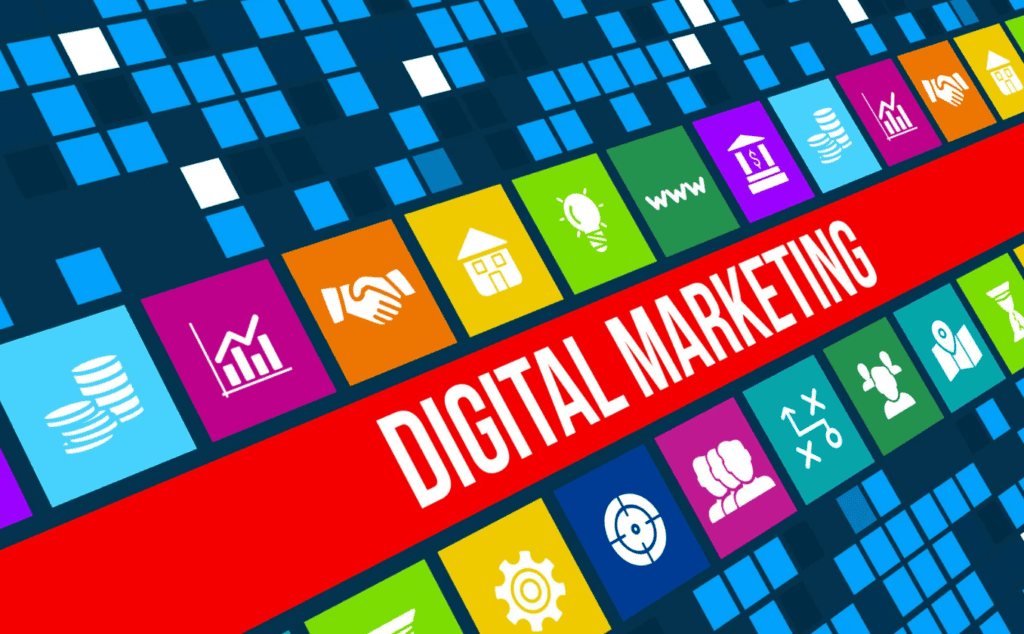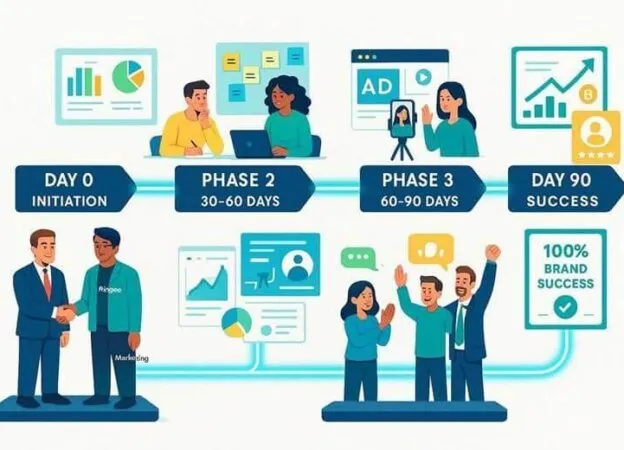Mastering the art of digital marketing has become a crucial linchpin for business success. The landscape of consumer engagement has dramatically shifted, making digital channels not just important, but necessary for reaching potential customers and fostering growth.
Table of Contents
In this blog post, we’ll explore the fundamental whys and hows of leveraging digital marketing to catapult your business to new heights.

From understanding the vast reach and precision targeting offered by digital platforms to implementing strategies that resonate with your target audience, we’re breaking down the essentials to help your business harness the power of digital marketing effectively.
Whether you’re a startup looking to make your mark or an established company aiming to maintain a competitive edge, this guide is your starting point for unlocking the potential of digital marketing for sustained business growth.

Understanding the Digital Landscape
Before you can effectively leverage digital marketing for your business, it’s essential to understand the digital landscape. Today’s digital environment is vast and varied, encompassing social media platforms, search engines, email marketing, content marketing, and more.
Each of these channels serves a unique purpose and reaches audiences in different stages of the customer journey. Understanding how these platforms work and the types of audiences they attract is crucial.
From working with a digital marketing agency to conducting market research and competitor analysis, it’s essential to gain a comprehensive understanding of the digital landscape to identify the best opportunities for your business. This knowledge will allow you to create a strategic plan that targets your desired audience and optimizes your ROI.
Targeted Reach
One of the most compelling advantages digital marketing offers over traditional marketing methods is the ability to target your marketing efforts with unprecedented precision.
Unlike broad-spectrum advertising mediums like television or print, which cast a wide net in the hope of catching a diverse audience, digital marketing allows you to narrow down your focus to the individuals most likely to be interested in your products or services.
This is accomplished through sophisticated algorithms that analyze user data—such as browsing habits, purchasing history, and personal preferences—to deliver your marketing content directly to the people who want to see it.
Platforms like Facebook, Instagram, and Google AdWords provide detailed targeting options, including demographic information (age, gender, location), interests (hobbies, favorite entertainment, consumer preferences), and even behavioral data (purchase history, brand interactions).
This targeted approach not only increases the efficiency of your marketing campaigns but also boosts their effectiveness, resulting in a higher conversion rate, better customer engagement, and a greater return on investment.
With targeted reach, you can ensure that your marketing budget is being used to its fullest potential, focusing your efforts on the audiences that matter most to your business.
Cost-Effectiveness
Another significant advantage of digital marketing lies in its cost-effectiveness, making it an accessible tool for businesses of all sizes. Traditional marketing channels often come with high entry costs and expenses that can escalate quickly, making them less viable for small businesses or those with limited budgets.
In contrast, digital marketing offers a range of budget-friendly options that can be tailored to suit financial constraints without compromising reach and impact.
For instance, pay-per-click (PPC) advertising allows businesses to control their spending by setting daily or campaign-specific budgets, ensuring that marketing expenses are predictable and manageable.
Similarly, content marketing and SEO (Search Engine Optimization) are cost-effective strategies that can drive organic traffic to your website over time, without the need for continuous financial input like traditional advertising.
By leveraging the power of digital channels, companies can achieve a better cost-per-acquisition (CPA) rate compared to traditional marketing methods. This efficiency not only maximizes the return on investment (ROI) but also enables businesses to allocate resources more effectively, investing saved funds into other growth-enhancing areas.
Measurable Results
One of the most significant benefits digital marketing offers over traditional marketing avenues is the ability to track and measure results in real-time. This level of measurability allows businesses to understand precisely how well their marketing campaigns are performing and to make data-driven decisions to improve future strategies.
Tools like Google Analytics, social media analytics, and email marketing software provide comprehensive insights into a wide array of metrics, including website traffic, conversion rates, engagement rates, click-through rates, and ROI.
By analyzing these metrics, marketers can identify which strategies are working and which aren’t, allowing for rapid adjustments to enhance campaign effectiveness. This immediate feedback loop is not achievable with traditional marketing methods, where results are often realized and measured over much longer periods.
Digital marketing’s measurable results enable a more agile business approach, optimizing marketing spend, and significantly improving the chances of achieving desired outcomes. This not only ensures a more efficient allocation of marketing budgets but also contributes to sustained business growth and competitiveness in the digital age.
Building Brand Awareness
Building brand awareness is more than just getting your name out there. It’s about telling a story that resonates with your audience, creating meaningful connections, and standing out in a crowded marketplace.
Digital marketing offers unique opportunities to elevate your brand’s visibility and establish its identity across multiple online platforms. Utilizing social media, content marketing, influencer partnerships, and video marketing, businesses can craft and disseminate a consistent brand message that captivates and engages their target audience.
Social media platforms are pivotal for building brand awareness. They serve as a direct line to consumers, allowing businesses to showcase their brand’s personality, values, and offerings through regular posts, stories, and interactions.
Engaging content that aligns with the interests and needs of your audience fosters a community around your brand, encouraging loyalty and word-of-mouth recommendations.
Content marketing, on the other hand, focuses on providing value to your audience through informative and relevant content. This strategy helps in establishing your brand as a thought leader and a trusted source of information, which is invaluable in building credibility and authority in your industry.
Influencer partnerships extend your brand’s reach to new audiences by leveraging the trust and rapport influencers have with their followers. A well-chosen influencer whose brand aligns with your own can introduce your products or services to a highly engaged audience authentically and compellingly.
Engaging Your Audience
Engaging your audience is a critical step in maximizing the impact of your digital marketing strategy. It’s not enough to simply reach your potential customers; you must also connect with them in a meaningful way to foster loyalty and encourage continued interaction.
Engagement can take many forms, from a like or share on social media to comments on your blog or reviews of your products. To effectively engage your audience, it’s important to create content that resonates with them.
This includes understanding their needs, preferences, and pain points, and crafting messages that speak directly to these elements. Interactive content, such as polls, quizzes, and contests, can also increase engagement by encouraging active participation rather than passive consumption.
Social media platforms offer unparalleled opportunities for engagement. Through regular, consistent posting and by responding to comments and messages, you can create a dynamic online community around your brand.
Personalization plays a key role here; addressing your audience by name in emails or tailoring content based on past interactions can make your communications feel more personal and relevant.
Ultimately, engaging your audience is about creating a dialogue. By listening to your customers and responding to their feedback, you can build stronger relationships, improve your products and services, and drive your business forward.
Engagement is the key to transforming passive observers into active brand advocates, contributing significantly to your business’s growth and success in the digital marketplace.

Driving Website Traffic
Driving website traffic is crucial for digital marketing success. Increased traffic means more opportunities to convert visitors into customers, which can significantly impact your business’s bottom line.
There are several strategies to boost website traffic, each leveraging different aspects of digital marketing to attract more visitors. Firstly, SEO (Search Engine Optimization) is a foundational element in increasing website visibility within search engine results.
By optimizing your website’s content and structure for relevant keywords, you can significantly improve your site’s ranking, making it more likely for potential customers to find you when they search for products or services related to your business.
Content marketing also plays a vital role in driving traffic. By creating valuable, informative, and engaging content, you can attract readers and encourage them to visit your website for more information.
This might be done via podcasts, films, infographics, or blog entries. Quality content not only helps with SEO but also increases shareability on social media, further amplifying your reach.
FAQs On Leveraging Digital Marketing
Q: Can digital marketing help my business if we operate in a niche market?
A: Absolutely. Digital marketing excels in targeting specific audiences, making it perfect for niche markets. Through precise targeting capabilities on platforms like Google AdWords and Facebook, you can reach your specific audience efficiently, even within a niche market.
Q: How long does it take to see results from digital marketing campaigns?
A: The timeline to see tangible results varies based on the strategies employed. Some tactics, like pay-per-click advertising, can yield immediate traffic increases, while others, such as SEO or content marketing, may take longer to show results, often several months. Consistency and strategy refinement are key.
Q: Is digital marketing suitable for B2B (business-to-business) companies?
A: Yes. Digital marketing is highly effective for B2B companies, especially in leveraging platforms like LinkedIn for networking and targeted advertising. Content marketing and SEO are also critical for establishing thought leadership and improving brand visibility amongst business clients.
Q: How significant is mobile optimization in terms of online advertising?
A: Mobile optimization is crucial. With an increasing number of users accessing the internet via smartphones, a mobile-friendly website is essential for ensuring a positive user experience, improving search engine rankings, and maximizing the effectiveness of your digital marketing efforts.
Digital marketing offers a range of benefits that can significantly impact a business’s success in the digital landscape.
From targeted reach and cost-effectiveness to measurable results, building brand awareness, engaging your audience, and driving website traffic, it is an essential tool for any modern business looking to thrive in the competitive online marketplace.
By leveraging the power of digital marketing strategies, businesses can better understand and connect with their audience, drive conversions, and achieve sustainable growth in the ever-evolving digital landscape.



